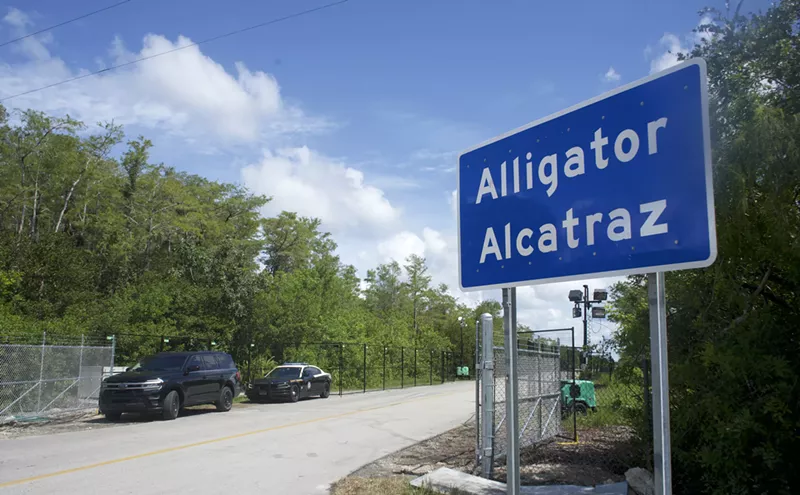"Miami Is Highly Unequal — But Is That Bad?" reads the headline of an article published today on Forbes.com. Unsurprisingly, for a piece in a publication named after and edited by arch free-market conservative Steve Forbes, the answer is, "No, not really." So you hear that, poor folks in Miami? Forbes thinks it's not so bad that you're struggling to get by.
The article's author, Scott Beyer, a "market urbanism" adherent who's spending the next three years living in 28 American cities for a month each, points to a Brookings Institute report from earlier this year that ranked Miami as the fourth most unequal city in America. What was surprising about that finding is that compared to the rest of the cities in the top ten, Miami's rich weren't extraordinarily rich, but rather that Miami's poor were so very poor. Households in the 20th percentile here pull in just $11,497 a year, by far the lowest of the cities in the top ten.
Beyer notes the city's high level of immigration and basically comes to the conclusion that Miami's income inequality isn't that harmful simply because poorer immigrants are better off than they were in their homeland.
"Many of Miami’s poor, meanwhile, resemble the migrants found throughout the developing world; they are often uneducated, were previously agrarian or slum-dwelling, are without English, and, in this case, come from the Caribbean and Central America," he writes, noting that income inequality is inevitable.
"But the more important question, again, is whether Miami provides these poorer immigrants a chance for a better life," he writes. "And on this front, the city has done historically well."
Of course, Beyer points to the examples of Cuban-Americans, which is entirely disingenuous because many of Miami's Cuban immigrants did not come here as uneducated, agrarian, or slum-dwelling. We all know the story by now and know how unique the Cuban diaspora is. Never mind that for all the Castro regime's faults, it still maintains an education system that aside from the Marxist propaganda, rates high internationally and has produced a literacy rate comparable to (or in some cases higher than) those of First-World countries. That's the great irony of Cuba. It has a smart, hard-working population stymied by the country's political and economic system. It's no wonder that when Cubans finally come to America, they often thrive.
Beyer than addresses the Haitian community's inability to do the same, and concludes they're better off here than they were in Haiti. He doesn't mention Miami's nonimmigrant African-American population. So the question, really, is whether Miami has actually done "historically well" in providing all poorer immigrants a chance for a better life. The results do not seem to indicate so.
But let's get to the larger question of whether this great inequality is bad.
Beyer says no. He notes that gentrification isn't as bad and predatory as it may be in other cities (which might be true, but it should be news to the former residents of Wynwood and Edgewater, and to those in Overtown and Little Haiti who are cautiously watching developers creep into their neighborhoods). He also points to some odd statistic that Miami has the "most efficient" roads in America, which is laughable. (The statistic says Miami's roads serve more residents per square mile, which, as anyone who drives here knows, is not a recipe for efficiency but rather monstrous traffic jams.) He notes rich people have helped fund infrastructure like museums and waterfront parks, which is great, but he neglects to mention that our public transportation system is woefully inept, our libraries are endangered, and our sewer system is on the brink of busting.
Nor is there mention of the growing research that income inequality has strong correlations with crime rates, poor health, teen pregnancy, and a variety of other social ills.
Look, Miami has by far the highest rate of HIV infection in the nation, Jackson Memorial Hospital continues to struggle under the demands of caring for Miami's uninsured poor, and Miami0Dade County is home to some of the most dangerous cities in America. These endemic problems, and several others, are directly affected by income inequality (and many of these problems cost human lives).
Apparently, that doesn't matter much to Beyer's argument.
"Rather than being fundamentally bad or exploitative places, they have long been, like Miami, upwardly mobile, and many remain so," he concludes. "Their disparities may not suit an idealist. But the advantages they offer seem to be recognized by all the poor people flooding into them."
But fostering an attitude of "they're better off here than they were there" is disingenuous (if not structurally racist) and dangerous because it may lead others to overlook many of Miami's problems.

Audio By Carbonatix
[
{
"name": "GPT - Billboard - Slot Inline - Content - Labeled - No Desktop",
"component": "22004575",
"insertPoint": "2",
"requiredCountToDisplay": "2"
},{
"name": "STN Player - Float - Mobile Only ",
"component": "22595215",
"insertPoint": "2",
"requiredCountToDisplay": "2"
},{
"name": "Editor Picks",
"component": "17482312",
"insertPoint": "4",
"requiredCountToDisplay": "1"
},{
"name": "Inline Links",
"component": "18711090",
"insertPoint": "8th",
"startingPoint": 8,
"requiredCountToDisplay": "7",
"maxInsertions": 25
},{
"name": "GPT - 2x Rectangles Desktop, Tower on Mobile - Labeled",
"component": "23181625",
"insertPoint": "8th",
"startingPoint": 8,
"requiredCountToDisplay": "7",
"maxInsertions": 25
},{
"name": "Inline Links",
"component": "18711090",
"insertPoint": "8th",
"startingPoint": 12,
"requiredCountToDisplay": "11",
"maxInsertions": 25
},{
"name": "GPT - Leaderboard to Tower - Slot Auto-select - Labeled",
"component": "17720761",
"insertPoint": "8th",
"startingPoint": 12,
"requiredCountToDisplay": "11",
"maxInsertions": 25
}
]











